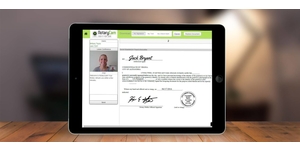
Before March 26, 2020, the answer was “no.” At that time, Louisiana law did not permit a lawyer1 to notarize a document remotely. Louisiana Revised Statutes section 35:2 provides that “all acts executed by a notary public, in conformity with the provisions of Civil Code Art. 1833, shall be authentic acts.” Louisiana Civil Code article 1833, which sets forth the protocol for a notary to create an “authentic act,” provides as follows:
A. An authentic act is a writing executed before a notary public or other officer authorized to perform that function, in the presence of two witnesses, and signed by each party who executed it, by each witness, and by each notary public before whom it was executed. The typed or hand-printed name of each person shall be placed in a legible form immediately beneath the signature of each person signing the act.
B. To be an authentic act, the writing need not be executed at one time or place, or before the same notary public or in the presence of the same witnesses, provided that each party who executes it does so before a notary public or other officer authorized to perform that function, and in the presence of two witnesses and each party, each witness, and each notary public signs it. The failure to include the typed or hand-printed name of each person signing the act shall not affect the validity or authenticity of the act.
C. If a party is unable or does not know how to sign his name, the notary public must cause him to affix his mark to the writing.
La. Civ. Code art. 1833.
Article 1833’s requirement of physical “presence” was mandatory and could not be satisfied through virtual presence. As a result, under the “old” law, a lawyer could not notarize a document executed by signatories who were participants in a video conference.
The Governor’s March 26, 2020 Proclamation
On March 26, 2020, Governor Edwards issued Proclamation No. 37 JBE 2020 to temporarily allow some–but not all–remote notarizations.2 Under that proclamation, a notary may perform a “notarization for an individual not in the physical presence of the notary public if the individual, any witnesses, and the notary public can communicate simultaneously by video conference, the notary has reasonably identified the individuals participating, the notary records the notarization and saves the recording for at least 10 years. Significantly this procedure is not allowed for “testaments, trust instruments, donations inter vivos, matrimonial agreements, acts modifying, waiving or extinguishing an obligation of final spousal support and authentic acts.” Finally, these limited remote notarizations are permissible “retroactively to the beginning on this emergency on Wednesday, March 11, 2020 to Monday, April 13, 2020, or as extended by any subsequent Proclamation, unless terminated sooner.”
The Future?
Louisiana, like many other states,3 is considering the adoption of permanent laws permitting remote notarization. Over the years, the Louisiana legislature has considered bills that would have permitted notarizations to take place via real-time video conferencing; none, however, became law. During the 2020 Regular Session, the Louisiana House will consider a bill, namely H.B. No. 274, that would permit remote notarization for some, but not all, authentic acts. The bill sets forth the types of authentic acts covered as well as procedures for analyzing credentials and identity proofing. On February 26, 2020, the bill was referred to the House Committee on Civil Law and Procedure.4
If lawyers have learned anything during the currently-developing COVID-19 crisis, it is that they need to be able to be able to move their matters along from outside of the office. Lawyers need notarized documents for all sorts of matters. They need affidavits to file and oppose motions for summary judgment. They need notarized signatures for releases. They need notarized signatures for power-of-attorney documents. Under the law as it now exists, a lawyer cannot obtain these necessary signatures remotely. The need to permanently adopt some form of remote notarization in Louisiana is more obvious now than ever.
- La. Stat. Ann. § 35:191 provides that an person who is licensed to practice law in the State of Louisiana is automatically a notary and is not required to take the pre-assessment test or the examination and can practice the functions of a notary public in any parish. ↵
- Note that Governor Andrew M. Cuomo issued a similar proclamation in New York State on March 19, 2020. HT to blog reader Jason Anders for sending along Governor Cuomo’s March 19, 2020, executive order allowing notarizations via video conferencing. ↵
- See https://www.nationalnotary.org/notary-bulletin/blog/2019/11/the-state-of-remote-online-notarization. ↵
- See http://www.legis.la.gov/legis/BillInfo.aspx?i=237845. ↵
